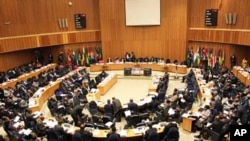African foreign ministers meeting in Addis Ababa are being confronted with several late-breaking developments as they survey the continent’s rapidly changing security landscape. Reports of non-agenda items such as Tunisia, Egypt and – more recently Gabon – have inserted themselves into the dialogue.
These African Union foreign ministers talks were meant to be primarily about Ivory Coast, Somalia and Sudan. These three countries are slated to be the subject of special mini-summits when heads of state arrive beginning Friday.
UN Secretary General Ban Ki-moon will be on hand to co-chair those meetings.
But events have a way of disrupting the best-laid plans. Hallway chatter at Thursday’s opening session of the foreign minister’s meeting was more about the arrest warrants issued for Tunisia’s former president Zine El Abedine Ben Ali, the unrest in Egypt, and the story of the opposition leader in Gabon who declared himself president this week, then sought UN protection.
AU Commission Chairman Jean Ping brought up the Tunisian question Thursday in his address to the opening session of the foreign ministers meeting. Hours earlier, he issued a strong statement about events in Gabon.
Mr. Ping, a former Gabonese foreign minister, condemned the opposition leader’s actions, saying they were likely to undermine the integrity of legitimate institutions.
AU spokesman Noureddine Mezni says delegates at these AU meetings are keeping a close eye on the latest developments in North Africa.
"These issues are not inscribed on the agenda of the summit, but of course I’m sure the member states will discuss among themselves,” Mezni said. “And as you noticed, Ping just mentioned the Tunisian case."
With the rapidly changing events in North Africa, the AU halls were abuzz Thursday with word that one regular summit attendee, Libyan leader Moammar Gadhafi, might miss this event. When asked whether Mr. Gadhafi was coming, Libya’s Foreign Minister Moussa Koussa turned and walked away.
Thursday’s opening ministerial session was addressed by visiting ministers from Japan, Denmark, India and Australia. Danish Foreign Minister Lene Espersen noted the recent trend toward democratization, and welcomed the African Union’s determination to halt the phenomenon of unconstitutional power grabs.
"It is unfortunate that recently we have seen a number of challenges to electoral processes and institutions, latest in Cote d’Ivoire,” said Espersen. “While these incidents are disappointing, the continent’s firm response has shown that Africa possesses a well-developed framework of agreed democratic standards, and a set of institutions to deal with such challenges."
Observers Friday will be watching closely to see whether South African President Jacob Zuma attends a special Heads of State level meeting of the AU Peace and Security Council on Ivory Coast.
Mr. Zuma is due to fly to Addis Ababa from Switzerland, where he has been attending the World Economic Forum. But news of Nelson Mandela’s hospitalization has sparked speculation he may go straight home to be at Mr. Mandela’s bedside.
Statements from the government and the Nelson Mandela Foundation have indicated the 92-year-old icon of South Africa’s anti-apartheid struggle is in no danger.
Security Developments Play Havoc With AU Summit Agenda




